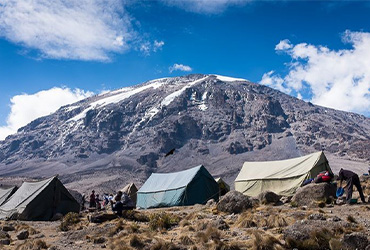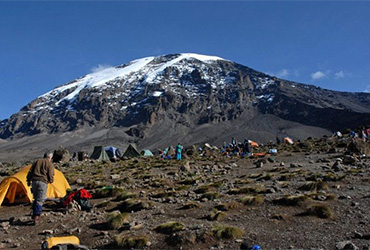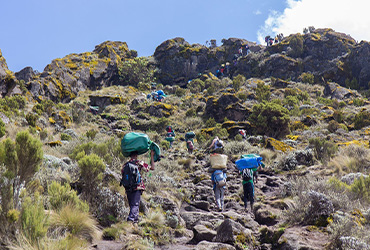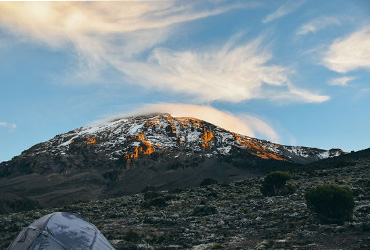Serengeti Balloon
- Duration: 3+ Days
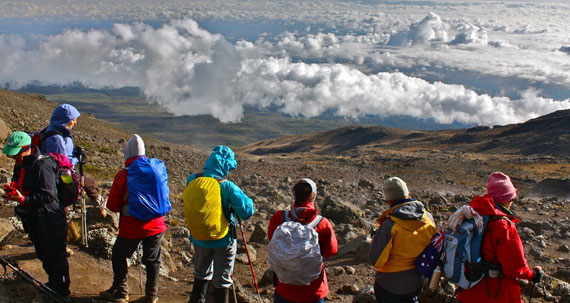
The Rongai Route presents an enchanting 6-day trekking experience on Mount Kilimanjaro, commencing from the northern side of the mountain. This route is renowned for its serene and less-crowded paths, providing climbers with a tranquil journey amidst breathtaking landscapes. Beginning at the Rongai Gate, trekkers traverse through dense forests rich in flora and fauna, gradually ascending through moorlands and alpine zones. The route offers picturesque views of Mawenzi Peak and the Kenyan plains along the way. Nights are spent at designated camps, including Simba Camp and Kibo Hut, allowing for essential rest and altitude acclimatization. The climb culminates in a summit push to Uhuru Peak on Day 5, offering awe-inspiring vistas of the African plains during the sunrise. The descent on Day 6 retraces the path through diverse terrains, concluding with a rewarding return to the Rongai Gate. With experienced guides and strategic altitude adjustments, the Rongai Route ensures a memorable and successful ascent to Africa's highest summit.
Kilimanjaro Climbing Itinerary |
|
| Route: | Rongai Route |
| Duration: | 6 Days |
| Starting & Ending Point: | Moshi or Arusha |
| Summit: | Uhuru Peak |
| Difficulty: | Challenging |
| Languages: | English |
6 Days Rongai Route - Kilimanjaro's Day by day Itinerary |
|
Day 0: |
Optional Airport Transfer and BriefingIf you have opted for the optional airport transfers, we will pick you up from Kilimanjaro Airport or Arusha airport and transfer you to your hotel in Moshi. Pre-trek briefing at your Moshi hotel. You should be planning to arrive at least one day before the start of the trek. Today we will spend having a pre-trek briefing. We will also review your equipment and rent any equipment which is needed. Meals: On your own Accommodation: Hotel in Moshi |
Day 1: |
Day 1:Nale Muru Gate to Simba CampBegin your journey at Nale Muru Gate, the starting point for your Kilimanjaro adventure. At an elevation of 2,020 m /6,627 f, this gate marks the beginning of a trek through lush forests and wildlife habitats. Look out for native animals as you ascend gradually, taking in the natural beauty of Kilimanjaro's lower slopes. Your day ends at Simba Camp, situated at 2,671 m /8,761 f, offering a peaceful setting for rest and preparation for the days ahead.
|
Day 2 |
Simba camp to Kikelewa campStart your day with a hearty breakfast at Simba Camp before setting off on your trek. The journey continues as you depart early for Kikilewa Camp, located at an elevation of 3,630 meters (11,906 feet). If the weather permits, you'll have a spectacular view of Kibo Volcano from Kikilewa Camp. This part of the trek requires more physical effort, so it's essential to take breaks and rest when needed to ensure a comfortable and enjoyable experience.
|
Day 3 |
Kikelewa Cave to Mawenzi TarnTrekking from Kikelewa Camp to Mawenzi Tarn Camp offers breathtaking views and diverse landscapes on Mount Kilimanjaro. Ascend from 3,630 meters to 4,330 meters through alpine desert terrain, encountering unique flora and possible wildlife sightings. Explore rugged peaks, sparse vegetation, and panoramic vistas, making this leg a memorable highlight of the Rongai Route.
|
Day 4 |
Mawenzi Tarn to Kibo HutsTrekking from Mawenzi Tarn to Kibo Huts marks a significant transition in the Kilimanjaro climb, as you ascend to higher altitudes and experience dramatic changes in landscape and climate. This leg of the journey covers approximately 0 kilometers or 6.2 miles kilometers and involves navigating through rocky terrain and alpine desert environments. Along the way, climbers can admire stunning views of Mawenzi Peak and other surrounding peaks, providing a sense of accomplishment and motivation. As you approach Kibo Huts, situated at an elevation of 4,700 meters (15,420 feet), the air becomes thinner, requiring careful acclimatization and preparation for the final push to Uhuru Peak.
|
Day 5 |
Kilimanjaro Summit: From Kibo Hut to Uhuru Peak and Descent to Horombo HutExperience the exhilarating final ascent from Kibo Hut to Uhuru Peak, Africa's highest point, at 5,895 meters (19,341 feet), followed by a rewarding descent to Horombo Hut at 3,700 meters (12,200 feet), on your unforgettable Kilimanjaro adventure.
Kibo to Uhuru peak Uhuru Peak to Horombo Hut |
Day 6 |
Descend from Horombo Huts to Marangu Gate and Return to Moshi/ArushaOn your final day, you'll descend from the Horombo Huts to Marangu Gate, marking the end of your Kilimanjaro adventure. The journey back offers a chance to reflect on the incredible experiences and achievements of your climb. As you make your way down through the changing landscapes, from alpine desert to lush rainforest, take in the scenic beauty one last time. Upon reaching Marangu Gate, where your trek began, you'll complete necessary formalities before heading back to Moshi or Arusha, concluding your memorable expedition with a sense of accomplishment and fond memories
|
|
Note: it's possible to adjust the itinerary based on your preferences, fitness level, and time constraints. You can customize the route, duration, rest days, summit timing, accommodations, group size, preparation days, side trips, and tour type to suit your needs. |
|
Prices | |
|---|---|
| No. of Pax | Est. Price per Person (USD) |
| 2-4 Pax | $1,790 |
| 5-7 Pax | $1,700 |
| 8-10 | $1,630 |
| Group Sharing | $1,580 |
INCLUSION & EXCLUSION |
|
| Included : |
Professional guide certified in wilderness first aid and CPR. Accommodations for 2 nights before and after the trek (Bed and Breakfast). Airport transfers. All meals during the trek. Drinking water and full board meals. All National Park and hut fees, crew permits, and VAT. Fair and sustainable wages for mountain crew. Complimentary oxygen cylinder. Portable private toilet and porter. Quality imported equipment. |
| Excluded: |
Flights to and from the trek starting point. Visa fees. Travel or Medical Insurance is mandatory and recommended; please seek recommendations. Medications. Tips and gratuities for the porters and mountain crew (20% industry standard recommended). Personal expenses for souvenirs or other purchases. Energy food and beverages, including alcoholic and soft drinks. Personal gear such as trekking poles, sleeping bags, etc. Any extra lodge nights required due to early descent from the mountain (additional charges apply). |
